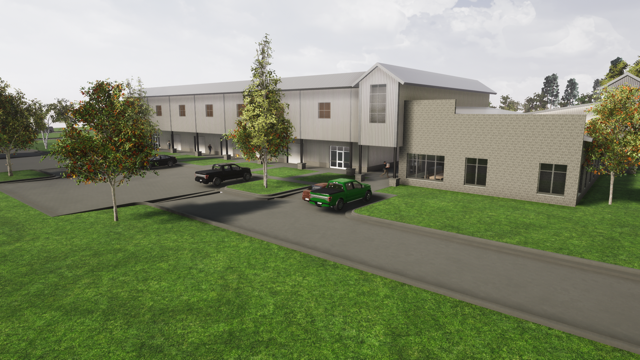Development Authority working on loans, incubator for small businesses
Published 5:58 pm Wednesday, April 3, 2019

- This is the architect's rendering of the front of the coming business incubator on Highway 133. The brick portion at the left will be the Moultrie-Colquitt County Development Authority's new home and also contain offices of about 150 square feet for startup companies in the county.
MOULTRIE, Ga. — It’s big news when a new company locates in a community, whether it brings 20 jobs or 200 or even more.
But for every one of those big announcements in Colquitt County there are hundreds of businesses and manufacturers, large and small, who have been here for years. Small business start-ups also typically go little-noticed.
These mom-and-pops, startups and small companies may get some love — and money — from planned revolving loan funds in the works by the Moultrie-Colquitt County Development Authority.
The authority also has a business incubator in the works that will give entrepreneurs and new businesses an assist with manufacturing, warehousing and office space in a project that is expected to be completed around the end of the year.
Actually separate programs for existing businesses and one for startup companies are under consideration.
“The way I see it, we’d have two revolving loan programs,” said Greg Icard, interim president of the development authority.
Icard is seeking state or federal grant money to set up the funds.
In a revolving loan program the agency overseeing the funds makes low-interest loans to businesses, with the idea that the companies pay back the money, which the agency will then lend to other companies.
Startup firms are higher-risk propositions than an existing business, Icard said.
“(But) for startups it can be a small amount of money,” he said.
Economists say that small businesses in the last two decades have accounted for from less than one-third to two-thirds of new jobs, depending on what definition of “small” is used.
Most employers in Colquitt County would fall under the more strict interpretation of fewer than 50 jobs.
Icard said the development authority is not competing with banks, but looking for a niche with promising new companies and local firms that have the opportunity for growth.
While the funds will not be limited to manufacturing, meaning retail businesses could be eligible, manufacturing jobs traditionally have been the holy grail for those working in economic development.
The rule of thumb is that each manufacturing job supports two other jobs in the community, and with the “multiplier effect” each helps support six jobs.
“Manufacturing jobs bring in retail growth,” Icard said. “I know manufacturing jobs do support a lot of jobs in the community.”
The incubator project is a roughly $2.5 million investment on Highway 133 South near the Sanderson Farms processing facility. It will consist of three metal buildings. Office space will be about $300 per month, including phone and internet connection.
It also will have industrial spaces available in 1,500-square-foot increments. The project, expected to be bid soon with an eight-month construction period, is expected to be completed around the end of 2019 and will total some 40,600 square feet.
“It will be up to 23 spaces of manufacturing, warehousing and industrial,” Icard said.
The development authority also will move its office to that location.
The business incubator is meant to help companies in their initial stages, and occupancy by a business will be a maximum of two years.
Businesses that are hatched, as it were, in such circumstances do have a better chances of success, Icard said.
“Based on figures I’ve seen, small business that go through an incubator have an 88 percent greater chances of success,” he said. “They’re getting high-end space for a small amount.”



